7-Day Mediterranean Diet Meal Plan for Insulin Resistance
This 7-day Mediterranean diet meal plan aims to reduce insulin resistance without skimping on flavor.
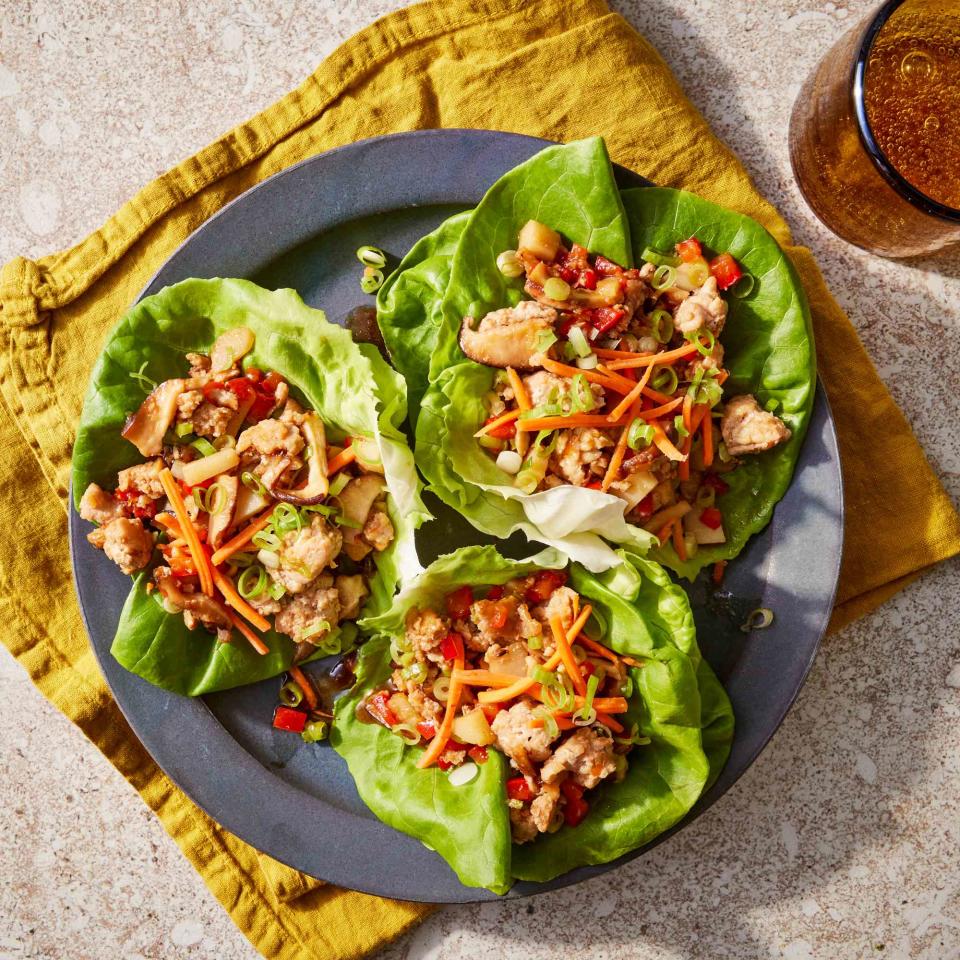
Reviewed by Dietitian Jessica Ball, M.S., RD
The Mediterranean diet was once again named the overall best diet in 2023, according to U.S. News & World Report. The report highlighted the diet's inclusion of a variety of healthy foods, like fruits and vegetables, whole grains, fish, nuts, seeds, olive oil and legumes. One of the biggest pros of the Mediterranean diet is that it doesn't exclude whole food groups or key nutrients and instead focuses on increasing healthy foods and making positive lifestyle changes, like cooking more meals at home and sharing meals with others.
Flexibility is not the only reason the Mediterranean diet receives high accolades; it also has a ton of health benefits, including improved heart health, a sharper brain and healthier blood sugar levels. Though the Mediterranean diet chatter historically focuses on foods common in countries like Spain, Italy and Greece, the Mediterranean region is much larger than that and spans three continents—Europe, Africa and Southwest Asia—to include 21 countries and two territories. This expansive region lends itself to a variety of diverse flavors, herbs, spices and foods, which means that most people can find flavors they enjoy in this nutritious way of eating. Plus, the focus on food groups allows the principles of the Mediterranean diet to align with any type of cuisine beyond the Mediterranean region as well.
In this Mediterranean diet plan, we aim to include foods that help combat insulin resistance, According to National Institute of Diabetes and Digestive and Kidney Diseases, insulin is a hormone made by our pancreas that helps transport glucose (sugar) out of our blood and into our muscles, fat and liver to be stored for energy. Insulin is responsible for regulating our blood sugars. With insulin resistance, the body doesn't respond as effectively to insulin, which results in the pancreas releasing more insulin to combat this decreased sensitivity. Initially, our body is able to handle insulin resistance by releasing enough insulin to return our blood sugar levels to normal. Eventually, however, the pancreas gets tired, insulin resistance increases and our body has a more difficult time regulating blood sugars, which can result in consistently higher-than-normal blood sugar levels. Insulin resistance is linked to an increased risk of developing conditions like prediabetes, type 2 diabetes, polycystic ovary syndrome, obesity, heart disease and nonalcoholic fatty liver disease, per StatPearls. Because weight loss can help reduce insulin resistance, according to the Centers for Disease Control and Prevention, we set this plan at 1,500 calories per day, which is a level where most people will lose weight. For those with other calorie needs, we also included modifications for 1,200 and 2,000 calories per day.
Can the Mediterranean Diet Help Improve Insulin Resistance?
Yes! According to 2020 research published in Nutrients, people who follow the Mediterranean diet are less likely to develop insulin resistance and its associated conditions, like type 2 diabetes and heart disease. Because the Mediterranean diet is so broad, there is not one single nutrient or food that we can point to as the reason for its associated health benefits. Rather, it's likely that the diet's high fiber content—from its inclusion of fruits, vegetables, whole grains, nuts and legumes—plays a role. Plus, the diet incorporates foods linked to reducing inflammation, like nutrient-rich fruits and vegetables, fish, unsaturated-fat-rich plant oils, herbs, spices, nuts and seeds. Though it doesn't completely restrict anything, the Mediterranean diet doesn't include a lot of added sugars or processed and refined grains, which are linked to increased blood sugar levels. And, the diet focuses on healthy habits around food, such as cooking more meals at home, sharing meals with others and finding overall enjoyment in our food again.
Mediterranean Diet Foods to Focus On:
The Mediterranean diet includes a wide variety of nutritious foods, including but not limited to:
Plant-based fats rich in unsaturated fats (olives, olive oil, avocado, canola and sunflower)
Nuts (almonds, walnuts, pistachios, pine nuts, cashews, macadamia nuts and more, including natural nut butters with just two ingredients: nuts and salt)
Seeds (flax, pumpkin, chia, sunflower and more)
Fish (especially fatty fish rich in omega-3s, like salmon, tuna, anchovy, sardines and mackerel)
Fruits (berries, pomegranate, cherry, citrus fruits, apples, pears, plums, peaches and more)
Vegetables (leafy greens, tomatoes, fennel, okra, potato, sweet potato, pumpkin, onions and more)
Legumes (beans, lentils, hummus, falafel and edamame)
Whole grains (brown rice, bulgur, freekeh, quinoa, oats, whole-wheat pasta and whole-wheat bread)
Dairy (kefir, yogurt and cheese)
Poultry
Eggs
Red meat (lamb, beef and pork)
Note: Though red meat is historically left off the Mediterranean-diet foods list, people in many Mediterranean countries do consume red meat. Again, no single food should be focused on or explicitly excluded; this healthy diet is more about what we eat as an overall pattern and how we eat. Focusing on homemade meals, food quality, healthy fats and plenty of fruits and vegetables are the core pieces of this lifestyle.
How to Meal-Prep Your Week of Meals:
Make Overnight Oats with Chia Seeds to have for lunch on Days 2 and 3.
Prepare Lentil Salad with Feta, Tomatoes, Cucumbers & Olives to have for lunch on Days 2 through 5.
Day 1
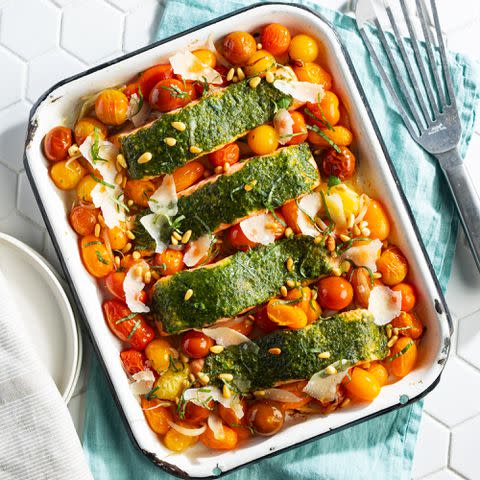
Breakfast (313 calories)
1 serving Summer Skillet Vegetable & Egg Scramble
⅔ cup blueberries
A.M. Snack (221 calories)
1 large apple
1 Tbsp. natural peanut butter
Lunch (384 calories)
1 serving White Bean & Avocado Toast
20 unsalted dry-roasted almonds
P.M. Snack (132 calories)
⅔ cup low-fat plain yogurt, such as Greek-style
⅓ cup raspberries
Dinner (446 calories)
1 serving Pesto Salmon
Daily Totals: 1,495 calories, 78g fat, 84g protein, 130g carbohydrate, 32g fiber, 1,460mg sodium
Make It 1,200 Calories: Change A.M. snack to 1 plum and omit yogurt at P.M. snack.
Make It 2,000 Calories: Add 1 cup low-fat plain kefir to breakfast, increase to 2 Tbsp. peanut butter at A.M. snack, add 3 Tbsp. sliced almonds to P.M. snack and add 1 serving Cucumber, Tomato & Avocado Salad to dinner.
Day 2
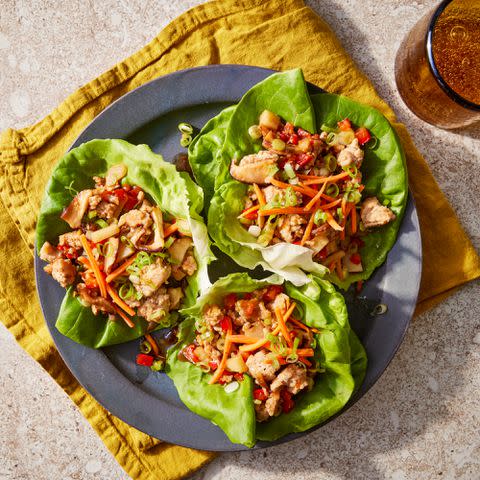
Breakfast (390 calories)
1 serving Overnight Oats with Chia Seeds
A.M. Snack (140 calories)
½ cup 1% fat low-sodium cottage cheese
1 medium peach
Lunch (390 calories)
1 serving Lentil Salad with Feta, Tomatoes, Cucumbers & Olives
1 cup low-fat plain kefir
P.M. Snack (141 calories)
¼ cup hummus
1 medium bell pepper, sliced
Dinner (435 calories)
1 serving Weeknight Chicken Lettuce Wraps
Daily Totals: 1,496 calories, 77g fat, 81g protein, 134g carbohydrate, 35g fiber, 1,863mg sodium
Make It 1,200 Calories: Omit kefir at lunch and hummus at P.M. snack, plus omit Purple Power Slaw with Sesame-Ginger Vinaigrette at dinner.
Make It 2,000 Calories: Add 2 hard-boiled large eggs to breakfast, 30 unsalted dry-roasted almonds to A.M. snack, and 1 medium apple to P.M. snack.
Day 3
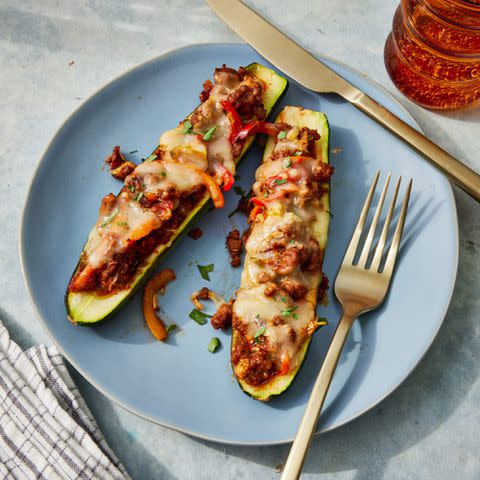
Breakfast (390 calories)
1 serving Overnight Oats with Chia Seeds
A.M. Snack (140 calories)
½ cup 1% fat low-sodium cottage cheese
1 medium peach
Lunch (390 calories)
1 serving Lentil Salad with Feta, Tomatoes, Cucumbers & Olives
1 cup low-fat plain kefir
P.M. Snack (172 calories)
½ cup unsalted dry-roasted pistachios, measured in shell
Dinner (392 calories)
1 serving Ground Turkey Zucchini Boats
1 serving Tomato & Cucumber Salad with Dill
Daily Totals: 1,484 calories, 82g fat, 83g protein, 120g carbohydrate, 32g fiber, 1,977mg sodium
Make It 1,200 Calories: Omit peach at A.M. snack, change P.M. snack to 1 plum, and omit Tomato & Cucumber Salad with Dill at dinner.
Make It 2,000 Calories: Add 2 hard-boiled large eggs to breakfast, 30 unsalted dry-roasted almonds to A.M. snack, and 1 medium banana to P.M. snack.
Day 4

Breakfast (339 calories)
1 cup low-fat plain strained yogurt, such as Greek-style
½ cup raspberries
1 serving Cinnamon-Toasted Oats
A.M. Snack (154 calories)
¼ cup hummus
2 medium carrots, cut into strips
Lunch (390 calories)
1 serving Lentil Salad with Feta, Tomatoes, Cucumbers & Olives
1 cup low-fat plain kefir
P.M. Snack (95 calories)
1 medium apple
Dinner (514 calories)
1 serving Goddess Veggie Bowls with Chicken
Daily Totals: 1,491 calories, 56g fat, 106g protein, 155g carbohydrate, 38g fiber, 1,405mg sodium
Make It 1,200 Calories: Omit Cinnamon-Toasted Oats at breakfast and kefir at lunch, and change P.M. snack to 1 medium peach.
Make It 2,000 Calories: Add 1 medium banana to lunch and 2 Tbsp. natural peanut butter to P.M. snack, and have ¼ cup unsalted dry-roasted almonds for evening snack.
Day 5
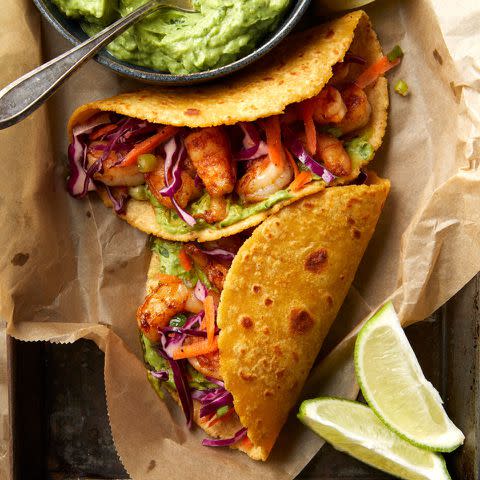
Breakfast (339 calories)
1 cup low-fat plain strained yogurt, such as Greek-style
½ cup raspberries
1 serving Cinnamon-Toasted Oats
A.M. Snack (172 calories)
½ cup unsalted dry-roasted pistachios, measured in shell
Lunch (390 calories)
1 serving Lentil Salad with Feta, Tomatoes, Cucumbers & Olives
1 cup low-fat plain kefir
P.M. Snack (200 calories)
1 medium apple
1 Tbsp. natural peanut butter
Dinner (415 calories)
1 serving Shrimp Tacos with Avocado Crema
1 cup pineapple chunks
Daily Totals: 1,516 calories, 68g fat, 82g protein, 157g carbohydrate, 36g fiber, 1,075mg sodium
Make It 1,200 Calories: Omit Cinnamon-Toasted Oats at breakfast, reduce to ¼ cup pistachios in shell at A.M. snack, and omit peanut butter at P.M. snack.
Make It 2,000 Calories: Add 3 Tbsp. sliced almonds to breakfast, add 1 plum to A.M. snack, increase to 2 Tbsp. peanut butter at P.M. snack, and add 1 serving Guacamole Chopped Salad to dinner.
Day 6
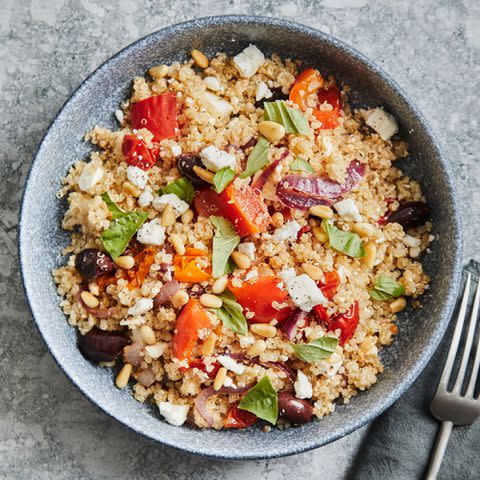
Breakfast (313 calories)
1 serving Summer Skillet Vegetable & Egg Scramble
⅔ cup blueberries
A.M. Snack (140 calories)
½ cup 1% fat low-sodium cottage cheese
1 medium peach
Lunch (377 calories)
1 serving Avocado, Tomato & Chicken Sandwich
1 plum
P.M. Snack (227 calories)
25 unsalted dry-roasted almonds
1 clementine
Dinner (459 calories)
½ cup canned unsalted white beans, rinsed
Daily Totals: 1,516 calories, 68g fat, 83g protein, 154g carbohydrate, 31g fiber, 1,167mg sodium
Make It 1,200 Calories: Change A.M. snack to ½ cup blackberries and omit almonds at P.M. snack.
Make It 2,000 Calories: Add 1 serving Raspberry-Kefir Power Smoothie to breakfast, add 1/2 cup unsalted dry-roasted pistachios in shell to A.M. snack, and substitute 1 medium apple for the plum at lunch.
Day 7
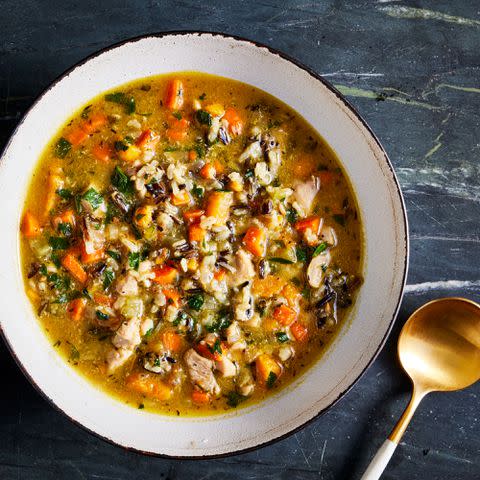
Breakfast (339 calories)
1 cup low-fat plain strained yogurt, such as Greek-style
½ cup raspberries
1 serving Cinnamon-Toasted Oats
A.M. Snack (252 calories)
1 medium apple
1½ Tbsp. natural peanut butter
Lunch (377 calories)
1 serving Avocado, Tomato & Chicken Sandwich
1 plum
P.M. Snack (59 calories)
1 medium peach
Dinner (449 calories)
1 serving Simple Cabbage Salad
Daily Totals: 1,476 calories, 54g fat, 97g protein, 156g carbohydrate, 31g fiber, 1,544mg sodium
Make It 1,200 Calories: Omit peanut butter at A.M. snack and omit Simple Cabbage Salad at dinner.
Make It 2,000 Calories: Add 1 serving Apple & Peanut Butter Toast to breakfast, increase to 2 Tbsp. natural peanut butter at A.M. snack, and add 25 unsalted dry-roasted almonds to P.M. snack.

